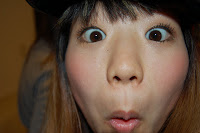 I believe all people, regardless of race or culture, have (at least) two sides to them: the side of them they allow people to see, and the side of them they keep hidden from most (if not all) others. In English, we have many words to describe either side; for the outer-self: a mask, facade, front, cover; for the inner-self: our true being, genuine self, "the real me". In Japan, they have ほんね (honne) and たてまえ (tatemae).
I believe all people, regardless of race or culture, have (at least) two sides to them: the side of them they allow people to see, and the side of them they keep hidden from most (if not all) others. In English, we have many words to describe either side; for the outer-self: a mask, facade, front, cover; for the inner-self: our true being, genuine self, "the real me". In Japan, they have ほんね (honne) and たてまえ (tatemae).Honne (pronounced: "ho-n-ne") is the inner-self, a person's genuine thoughts and words. Tatemae (pronounced: "tah-tey-mah-eh") is the outer-self, the words and expressions that they reveal to most people on a daily basis.
As I mentioned before, this phenomenon isn't anything new or unique to Japanese p
 eople; we're all guilty of it on one level or another. However, what sets Japan apart (at least from the U.S.) is that the concept of honne/tatemae is something that is indoctrinated into them from an early age, and not just from parents, but from schools, work...the culture at large!
eople; we're all guilty of it on one level or another. However, what sets Japan apart (at least from the U.S.) is that the concept of honne/tatemae is something that is indoctrinated into them from an early age, and not just from parents, but from schools, work...the culture at large!In the U.S., I believe, the degree to which one is willing and able to express their true feelings/thoughts depends heavily on their environment: who their parents are, how they were raised, what they believe. However, I wouldn't go so far as to say it's a cultural thing; there's no conscious, collective pressure to repress one's true thoughts and emotions. However, in Japan there is, and that's what frustrates me.
The people here, even if they desparately want to "be themselves" often feel that they simply can't. Again, I realize this dilemma exists everywhere (including the U.S.), but n
 ot on a cultural level. For example, there have been many times (while living in the U.S.) that I've felt I couldn't "be myself", but it had very little (or nothing) to do with the societal norm, but rather my own personal insecurities. In Japan, however, even a very emotionally-secure person would still feel pressure from their culture to withhold expressing their honest thoughts or opinions.
ot on a cultural level. For example, there have been many times (while living in the U.S.) that I've felt I couldn't "be myself", but it had very little (or nothing) to do with the societal norm, but rather my own personal insecurities. In Japan, however, even a very emotionally-secure person would still feel pressure from their culture to withhold expressing their honest thoughts or opinions. To be fair, not every Japanese person conforms to this norm utterly and completely. Many of my Japanese friends, for example, are much more "open" than the average nihonjin (Japanese person). In particular, many of my Japanese friends who have come on the Homestay International homestay program have been extremely "un-Japanese-like", especially while they were visiting in the U.S..
To be fair, not every Japanese person conforms to this norm utterly and completely. Many of my Japanese friends, for example, are much more "open" than the average nihonjin (Japanese person). In particular, many of my Japanese friends who have come on the Homestay International homestay program have been extremely "un-Japanese-like", especially while they were visiting in the U.S..Am I being ethnocentric by expressing that I feel this cultural norm is a problem? Maybe, but I'm not suggesting that the U.S.'s culture is superior and that Japan should completely abandon their own & adopt ours; our culture has quite a few blemishes of its own! Howe
 ver, on the issue of honne/tatemae, I believe I'm justified in suggesting that the Japanese challenge this cultural standard, and decide for themselves just how "open" they're comfortable being, WITHOUT the condemning eye of the cultural watchdog :D
ver, on the issue of honne/tatemae, I believe I'm justified in suggesting that the Japanese challenge this cultural standard, and decide for themselves just how "open" they're comfortable being, WITHOUT the condemning eye of the cultural watchdog :D

No comments:
Post a Comment